Strictly Personal
We’re being punished for sinning against our best writers; fare thee well, Micere, By Charles Onyango-Obbo
Published
10 months agoon
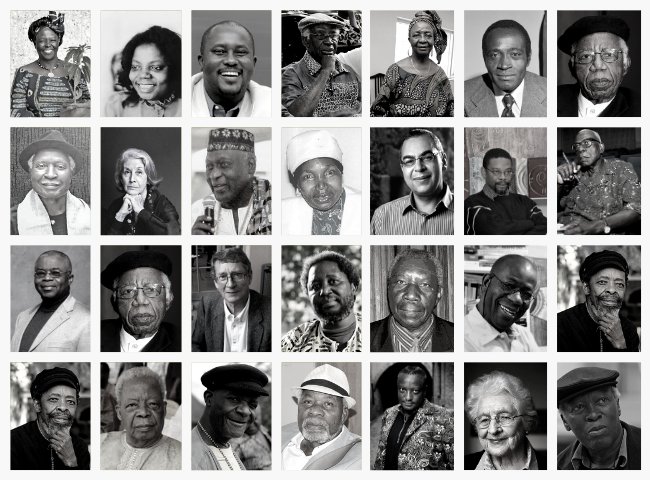
Influential Kenyan playwright, author, activist, and poet Micere Githae Mugo died in the United States on June 30, 2023. She was 81.
Micere was a lecturer at the University of Nairobi until 1982, when she was forced into exile by the not-so-gentle regime of Daniel arap Moi for her activism and moved to teach in Zimbabwe, and then the US.
Micere was stripped of her Kenyan citizenship but granted Zimbabwean citizenship. Her full Kenyan citizenship rights were only restored after the end of the Moi rule in December 2002, during the presidency of Mwai Kibaki.
She was one of many Kenyan writers or storytellers who lost her citizenship. There were a couple, including Salim Lone, journalist and later editor of Africa Emergency Report in New York. Deleting citizenship was a popular tool, especially against intellectuals, journalists and writers in East Africa and Africa.
In 1985, leading Ugandan and African political science scholar and author Prof Mahmood Mamdani was stripped of his since-restored citizenship by the Milton Obote government. It was a strange case.
Speaking — of all places — at a Red Cross conference, Mamdani said natural disasters were social crises resulting from human action and state policies (echoing Indian economist and philosopher Amartya Kumar Sen’s argument that famines do not occur in democracies).
At that time, the northeast Uganda region of Karamoja, and parts of the West Nile, were suffering starvation, and the Obote government didn’t take it well. By the way, Karamoja still endures equal proportions of famines, 38 years later.
In East Africa, the removal of citizenship or withdrawal of passports is falling out of favour, except in Tanzania, which keeps falling off the wagon. Among the more high-profiles cases, not too long ago, the Tanzania government stripped Ali Mohammed Nabwa, who was managing editor of the Zanzibar weekly newspaper, Dira, of his citizenship.
It also remains a cynical tool against political rivals in the Democratic Republic of Congo. In 2018, with elections approaching, the Joseph Kabila government declared that charismatic politician and businessman Moise Katumbi was not considered a citizen.
He was blocked from returning to contest the polls. With another election approaching later this year, the decibels about Katumbi not being a citizen are up again.
However, most African writers, intellectuals and journalists didn’t leave their countries because they were stripped of citizenship. They escaped persecution and death.
On May 21, a very close friend of Micere, Ghanaian author, playwright and poet Ama Ata Aidoo died. Like Micere, she, too, was 81. Like Micere, she lived outside Ghana, but in self-imposed exile, and produced some of her best work there.
One of Africa’s most prominent authors, Kenya’s Ngũgĩ wa Thiong’o, was imprisoned and exiled by the Moi government. The legendary Nigerian author Chinua Achebe lived in the US for several years.
The South African apartheid regime exiled a generation of writers — black, coloured, and white — from Lewis Nkosi, Mbulelo Mzamane, and Alex La Guma to Dennis Brutus and Breyten Breytenbach.
The rule of Field Marshal Idi Amin in Uganda saw nearly all its writers flee, with some of the best of them – Okot p’Bitek, Robert Serumaga, John Ruganda and Austin Bukenya – riding it out in Kenya.
Their flight continues, including more recently Kakwenza Rukirabashaija, he of the Greedy Barbarian fame, and poet, scholar and feminist activist Stella Nyanzi, who wrote the unsurpassably saucy No Roses from My Mouth: Poems from Prison, in 2019 and 2020 from Luzira Women’s Prison in Kampala.
The 2021 Nobel Prize for Literature winner Abdulrazak Gurnah left Zanzibar in 1968.
Some writers who left home in the 1970s, like Somali author Nuruddin Farah, undoubtedly Africa’s most prolific novelist, are still wandering. He says he is an international nomad and has lived in many African and Western nations.
Micere’s passing should tell us three things. First, we are witnessing the last of that wonderful first and second generation of pioneering African writers. Nobel laureate Wole Soyinka, Nuruddin Farah and Ngũgĩ are the handful who are still with us. We should cherish them.
Second, you have to give it to African strongmen. The two things even the illiterate among them understood were the power of ideas and the force of stories and narratives. And so, they took the hammer to intellectuals and writers and ran them out of town. Or simply jailed and murdered them.
But the most enduring has been how their persecution and exile tilted the production of African ideas. The best writing and publishing of African writers was based outside the continent. Many of them could only ply their trade at African Literature and Studies departments in universities in Europe and North America.
In turn, these universities became the leading products of modern African knowledge, and everyone in the world, including African governments, turned to them as oracles on the continent. For the past twenty years, many have screamed themselves hoarse about the “biased Western/White gaze” on Africa.
The distortions of the “African story” and history by jaundiced outsiders. The paternalism of Western knowledge institutions. The modern roots of all that lie in the 1960s to 1980s mass purge of African intellectuals from the continent. The longer, deeper roots lie in colonialism.
Western universities’ dominance of African scholarship probably has another 25 years to run. We dug half of our intellectual graves.
Charles Onyango-Obbo is a journalist, writer, and curator of the “Wall of Great Africans”. Twitter@cobbo3
Strictly Personal
This Sudan war is too senseless; time we ended it, By Tee Ngugi
Published
7 days agoon
April 28, 2024
Why are the Sudanese Armed Forces (SAF) and the paramilitary Rapid Support Forces (RPF) engaged in a vicious struggle? It is not that they have ideological, religious or cultural differences.
Not that people should fight because of these kinds of differences, but we live in a world where social constructions often lead to war and genocide. It is not that either side is fighting to protect democracy. Both sides were instruments of the rapacious dictatorship of Omar el-Bashir, who was overthrown in 2019.
Both are linked to the massacres in Darfur during Bashir’s rule that led to his indictment by the International Criminal Court for crimes against humanity. They both stood by as ordinary, unarmed people took to the streets and forced the removal of the Bashir regime.
None of these entities now fighting to the last Sudanese citizen has any moral authority or constitutional legitimacy to claim power. They both should have been disbanded or fundamentally reformed after the ouster of Bashir.
The SAF and the RSF are fighting to take over power and resources and continue the repression and plunder of the regime they had supported for so long. And, as you can see from news broadcasts, they are both well-versed in violence and plunder.
Since the fighting began in 2023, both sides have been accused of massacres that have left more than 30,000 people dead. Their fighting has displaced close to 10 million people. Their scramble for power has created Sudan’s worst hunger crisis in decades. Millions of refugees have fled into Chad, Ethiopia and South Sudan.
The three countries are dubious places of refuge. Chad is a poor country because of misrule. It also experiences jihadist violence. Ethiopia is still simmering with tensions after a deadly inter-ethnic war.
And South Sudan has never recovered from a deadly ethnic competition for power and resources. African refugees fleeing to countries from which refugees recently fled or continue to flee sums up Africa’s unending crisis of governance.
Africa will continue to suffer these kinds of power struggles, state failure and breakdown of constitutional order until we take strengthening and depersonalising our institutions as a life and death issue. These institutions anchor constitutional order and democratic process.
Strong independent institutions would ensure the continuity of the constitutional order after the president leaves office. As it is, presidents systematically weaken institutions by putting sycophants and incompetent morons in charge. Thus when he leaves office by way of death, ouster or retirement, there is institutional collapse leading to chaos, power struggles and violence. The African Union pretends crises such as the one in Sudan are unfortunate abnormally. However, they are systemic and predictable. Corrupt dictatorships end in chaos and violence.
Tee Ngugi is a Nairobi-based political commentator.
Strictly Personal
Air Peace, capitalism and national interest, By Dakuku Peterside
Published
3 weeks agoon
April 16, 2024
Nigerian corporate influence and that of the West continue to collide. The rationale is straightforward: whereas corporate activity in Europe and America is part of their larger local and foreign policy engagement, privately owned enterprises in Nigeria or commercial interests are not part of Nigeria’s foreign policy ecosystem, neither is there a strong culture of government support for privately owned enterprises’ expansion locally and internationally.
The relationship between Nigerian businesses and foreign policy is important to the national interest. When backing domestic Nigerian companies to compete on a worldwide scale, the government should see it as a lever to drive foreign policy, and national strategic interest, promote trade, enhance national security considerations, and minimize distortion in the domestic market as the foreign airlines were doing, boost GDP, create employment opportunities, and optimize corporate returns for the firms.
Admitted nations do not always interfere directly in their companies’ business and commercial dealings, and there are always exceptions. I can cite two areas of exception: military sales by companies because of their strategic implications and are, therefore, part of foreign and diplomatic policy and processes. The second is where the products or routes of a company have implications for foreign policy. Air Peace falls into the second category in the Lagos – London route.
Two events demonstrate an emerging trend that, if not checked, will disincentivize Nigerian firms from competing in the global marketplace. There are other notable examples, but I am using these two examples because they are very recent and ongoing, and they are typological representations of the need for Nigerian government backing and support for local companies that are playing in a very competitive international market dominated by big foreign companies whose governments are using all forms of foreign policies and diplomacy to support and sustain.
The first is Air Peace. It is the only Nigerian-owned aviation company playing globally and checkmating the dominance of foreign airlines. The most recent advance is the commencement of flights on the Lagos – London route. In Nigeria, foreign airlines are well-established and accustomed to a lack of rivalry, yet a free-market economy depends on the existence of competition. Nigeria has significantly larger airline profits per passenger than other comparable African nations. Insufficient competition has resulted in high ticket costs and poor service quality. It is precisely this jinx that Air Peace is attempting to break.
On March 30, 2024, Air Peace reciprocated the lopsided Bilateral Air Service Agreement, BASA, between Nigeria and the United Kingdom when the local airline began direct flight operations from Lagos to Gatwick Airport in London. This elicited several reactions from foreign airlines backed by their various sovereigns because of their strategic interest. A critical response is the commencement of a price war. Before the Air Peace entry, the price of international flight tickets on the Lagos-London route had soared to as much as N3.5 million for the economy ticket. However, after Air Peace introduced a return economy class ticket priced at N1.2 million, foreign carriers like British Airways, Virgin Atlantic, and Qatar Airways reduced their fares significantly to remain competitive.
In a price war, there is little the government can do. In an open-market competitive situation such as this, our government must not act in a manner that suggests it is antagonistic to foreign players and competitors. There must be an appearance of a level playing field. However, government owes Air Peace protection against foreign competitors backed by their home governments. This is in the overall interest of the Nigerian consumer of goods and services. Competition history in the airspace works where the Consumer Protection Authority in the host country is active. This is almost absent in Nigeria and it is a reason why foreign airlines have been arbitrary in pricing their tickets. Nigerian consumers are often at the mercy of these foreign firms who lack any vista of patriotism and are more inclined to protect the national interest of their governments and countries.
It would not be too much to expect Nigerian companies playing globally to benefit from the protection of the Nigerian government to limit influence peddling by foreign-owned companies. The success of Air Peace should enable a more competitive and sustainable market, allowing domestic players to grow their network and propel Nigeria to the forefront of international aviation.
The second is Proforce, a Nigerian-owned military hardware manufacturing firm active in Rwanda, Chad, Mali, Ghana, Niger, Burkina Faso, and South Sudan. Despite the growing capacity of Proforce in military hardware manufacturing, Nigeria entered two lopsided arrangements with two UAE firms to supply military equipment worth billions of dollars , respectively. Both deals are backed by the UAE government but executed by UAE firms.
These deals on a more extensive web are not unconnected with UAE’s national strategic interest. In pursuit of its strategic national interest, India is pushing Indian firms to supply military equipment to Nigeria. The Nigerian defence equipment market has seen weaker indigenous competitors driven out due to the combination of local manufacturers’ lack of competitive capacity and government patronage of Asian, European, and US firms in the defence equipment manufacturing sector. This is a misnomer and needs to be corrected.
Not only should our government be the primary customer of this firm if its products meet international standards, but it should also support and protect it from the harsh competitive realities of a challenging but strategic market directly linked to our national military procurement ecosystem. The ability to produce military hardware locally is significant to our defence strategy.
This firm and similar companies playing in this strategic defence area must be considered strategic and have a considerable place in Nigeria’s foreign policy calculations. Protecting Nigeria’s interests is the primary reason for our engagement in global diplomacy. The government must deliberately balance national interest with capacity and competence in military hardware purchases. It will not be too much to ask these foreign firms to partner with local companies so we can embed the technology transfer advantages.
Our government must create an environment that enables our local companies to compete globally and ply their trades in various countries. It should be part of the government’s overall economic, strategic growth agenda to identify areas or sectors in which Nigerian companies have a competitive advantage, especially in the sub-region and across Africa and support the companies in these sectors to advance and grow to dominate in the African region with a view to competing globally. Government support in the form of incentives such as competitive grants ,tax credit for consumers ,low-interest capital, patronage, G2G business, operational support, and diplomatic lobbying, amongst others, will alter the competitive landscape. Governments and key government agencies in the west retain the services of lobbying firms in pursuit of its strategic interest.
Nigerian firms’ competitiveness on a global scale can only be enhanced by the support of the Nigerian government. Foreign policy interests should be a key driver of Nigerian trade agreements. How does the Nigerian government support private companies to grow and compete globally? Is it intentionally mapping out growth areas and creating opportunities for Nigerian firms to maximize their potential? Is the government at the domestic level removing bottlenecks and impediments to private company growth, allowing a level playing field for these companies to compete with international companies?
Why is the government patronising foreign firms against local firms if their products are of similar value? Why are Nigerian consumers left to the hands of international companies in some sectors without the government actively supporting the growth of local firms to compete in those sectors? These questions merit honest answers. Nigerian national interest must be the driving factor for our foreign policies, which must cover the private sector, just as is the case with most developed countries. The new global capitalism is not a product of accident or chance; the government has choreographed and shaped it by using foreign policies to support and protect local firms competing globally. Nigeria must learn to do the same to build a strong economy with more jobs.
EDITOR’S PICK


FX bank swaps account for 30% of Nigeria’s external reserves— Fitch
Global credit ratings firm, Fitch, has claimed that approximately 30% of Nigeria’s external reserves is comprised of foreign exchange (FX)...


Nigeria: Civil society group sues 36 govs, Wike over N5.9tn, $4.6bn loans
A civil society organisation in Nigeria, Socio-Economic Rights and Accountability Project (SERAP), has dragged the 36 state governors of the...
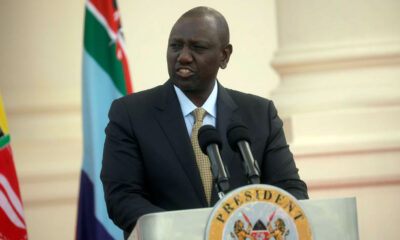

Kenya: President Ruto hints at ‘dire’ weather outlook as Cyclone Hidaya nears
President William Ruto has announced that the severe rains that have been plaguing Kenya for the past several weeks resulting...


Again, Rwanda denies it attacked displaced persons in DR Congo
For the sixteenth time, Rwanda refuted US charges on Saturday that its troops attacked a camp for internally displaced persons...


Nigeria offers oil majors faster exit if …
Oil-rich West African country, Nigeria, has offered major oil companies, such as Exxon Mobil and Shell, that planned to leave...


Nigeria’s Security Exchange chief to meet foreign, local crypto exchanges, others over crypto regulation
On Monday, local and international cryptocurrency exchanges will meet with Dr. Emomotimi Agama, the recently appointed Director General of the...


Rhino Resources, BP-Eni JV sign agreement for Namibia offshore licence
Rhino Resources Namibia and a BP-Eni joint venture have agreed to share a 42.5% stake in a block located in...
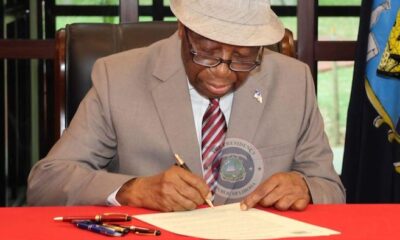

Liberia: President Boakai signs order to create war crimes court
To provide long-overdue justice to those who suffered grave injustices during the two civil wars that raged in Liberia, President...
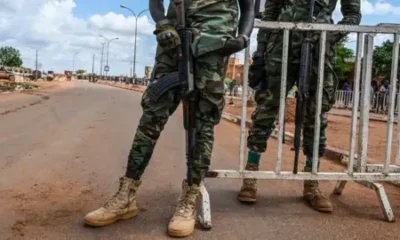

US official accuses Russian troops of entering base housing US military in Niger
According to a senior United States defence official quoted by Reuters, Russian military soldiers have entered an air base in...
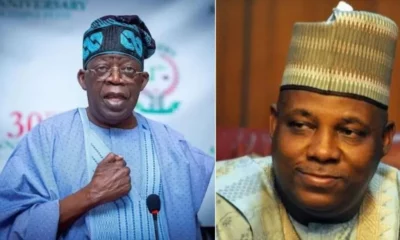

Nigeria’s presidency insists reforms prevented economic collapse
Nigeria’s presidency on Thursday reiterated that the current administration’s economic reforms of the past one year “saved the life of...
Trending
-

 Sports2 days ago
Sports2 days agoLiverpool legend Graham Souness wants ‘selfish’ Salah to leave club
-

 VenturesNow19 hours ago
VenturesNow19 hours agoNigeria offers oil majors faster exit if …
-

 Sports22 hours ago
Sports22 hours agoKenyan footballer arrested over brutal robbery, murder case
-

 Culture2 days ago
Culture2 days agoEgypt unveils stamp to mark 100th anniversary of relationship with Brazil


